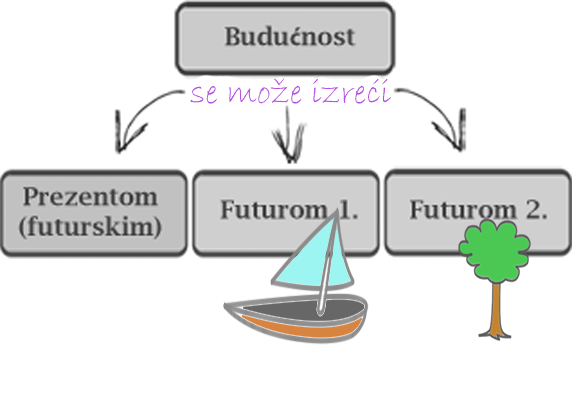The future tense of the verbs is formed by the short form of htjeti as an auxiliary and the infinitive of the main verb. There are two ways in which we can combine the two parts of the future tense: a) use the enclitic form before the main verb which can be expressed in two ways:
1. as infinitive (pisati) or
2. with a linking da and conjugated verb in the present tense (da pišem), and
b) add the enclitic form to the verbal stem (made by dropping the –ti ending of the infinitive):
- Enclitic plus infinitive: b) Verbal stem plus enclitic
Ja ću čitati Čitaću
Ti ćeš čitati Čitaćeš
On će čitati Čitaće
Mi ćemo čitati Čitaćemo
Vi ćete čitati Čitaćete
Oni će čitati Čitaće
Note that since auxiliary verb already indicates person and number, any pronoun used as subject my be omitted. However, verbs whose infinitive forms end in –ći, such as ići, are never shortened or written together – in this case also, the rule on enclitic word order must be applied:
Ja ću ići. Ići ću.
Ti ćeš ići. Ići ćeš.
On će ići. Ići će.
Mi ćemo ići. Ići ćemo.
Vi ćete ići. Ići ćete.
Oni će ići. Ići će.
Ja ću da idem.
Ti ćeš da ideš.
On će da ide.
Mi ćemo da idemo.
Vi ćete da idete.
Oni će da idu.
The negative future tense is formed by negating the auxiliary verb which now may stand at the beginning of the sentence or in any other position, since it’s no longer an enlictic:
Ja neću ići. or: Ja neću da idem
Ti nećeš ići. Ti nećeš da ideš.
On neće ići. On neće da ide.
Mi nećemo ići. Mi nećemo da idemo.
Vi nećete ići. Vi nećete da idete.
Oni neće ići. Oni neće da idu.
Exercises:
Complete the following sentences with the appropriate future tense forms of the verbs, such as shown in the model:
Model:
Vi (raditi) od 9 sati.
Vi ćete raditi od 9 sati.
- Mi (živjeti) vrlo blizu. _________________________________________________________
- Oni (raditi) blizu te banke. ____________________________________________________
- Vi (vidjeti) tu visoku ženu. _____________________________________________________
- Da li on (misliti) tako?________________________________________________________
- Da li ona (pitati) gdje je pošta?_________________________________________________
- Oni (preći) ulicu ovdje. _______________________________________________________
- Oni (naći) to mjesto. _________________________________________________________
- Oni (pitati) gdje je to. ________________________________________________________
- Ona (kazati) da živi tamo.____________________________________________________
- Ja (setiti se) toga gospodina. __________________________________________________
- Ja (planirati) da idem kod doktora.______________________________________________
- Ja (tražiti) gospođicu u njenoj kancelariji. _________________________________________
- On (prodati) staru kuću. _______________________________________________________

